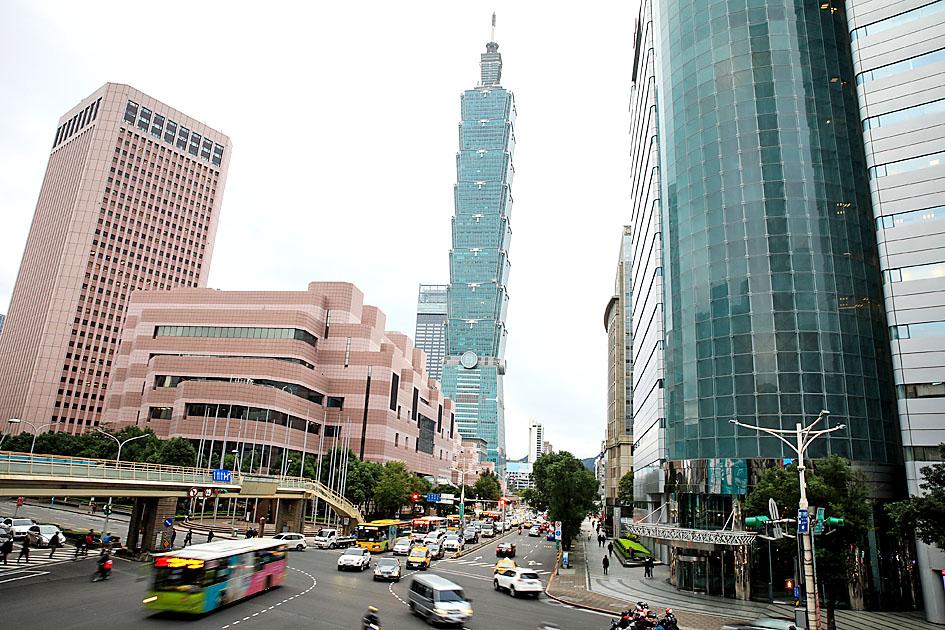Taiwan’s economy is likely to grow at a rate of 2.8 percent this year, which would be a solid follow-up to an estimated 5.5 percent increase last year, DBS Bank Ltd (星展銀行) said on Monday.
A slowing Chinese economy would likely weigh on exports from Taiwan, the Singapore-based bank added.
“We project that GDP will grow 2.8 percent this year, a slower rate than the 5.5 percent gain last year, but still in line with the long-term average trend,” bank economist Ma Tieying (馬鐵英) told a videoconference.

Photo: I-Hwa Cheng, Bloomberg
DBS stands by its October forecast, although major barometers have indicated that Taiwan could outperform, Ma added.
Last year’s robust showing would create unfavorable comparison base and China’s slowdown would weigh on exports from Taiwan, she said, adding that China accounts for more than 40 percent of Taiwanese exports.
Domestic demand would pick up, thanks to Taiwan’s successful control of the COVID-19 pandemic, she said.
Taiwan would continue to outperform regionally and finish this year with a 12 percent increase above pre-pandemic levels, Ma said.
By contrast, Singapore, Hong Kong and South Korea would end the year only 2 to 6 percent higher than their levels three years ago, she said.
The boom in the semiconductor sector, led by Taiwan Semiconductor Manufacturing Co (台積電), is shoring up Taiwan’s economy, but the advantage is likely to be less evident this year, with only an 8.8 percent increase forecast for the global semiconductor market, down from last year’s 25.6 percent spike, Ma said, citing data from World Semiconductor Trade Statistics.
While consumer spending this year is expected to shift away from PCs and other electronic devices that support remote working and distance learning, spending on smartphones is likely to grow, driven by people upgrading to 5G devices and recovery of demand in emerging markets, DBS said.
The digital transformation is expected to accelerate, fueling demand for virtual reality hardware, autonomous vehicles and smart factories, among other sectors, it said.
DBS expects the central bank to raise interest rates by 25 basis points this year — raising the rediscount rate to 1.25 percent in September and to 1.375 percent in December — from the existing rate of 1.125 percent.
“The time is ripe for monetary normalization, as the recovery will be broad-based this year,” Ma said.

MULTIFACETED: A task force has analyzed possible scenarios and created responses to assist domestic industries in dealing with US tariffs, the economics minister said The Executive Yuan is tomorrow to announce countermeasures to US President Donald Trump’s planned reciprocal tariffs, although the details of the plan would not be made public until Monday next week, Minister of Economic Affairs J.W. Kuo (郭智輝) said yesterday. The Cabinet established an economic and trade task force in November last year to deal with US trade and tariff related issues, Kuo told reporters outside the legislature in Taipei. The task force has been analyzing and evaluating all kinds of scenarios to identify suitable responses and determine how best to assist domestic industries in managing the effects of Trump’s tariffs, he

TIGHT-LIPPED: UMC said it had no merger plans at the moment, after Nikkei Asia reported that the firm and GlobalFoundries were considering restarting merger talks United Microelectronics Corp (UMC, 聯電), the world’s No. 4 contract chipmaker, yesterday launched a new US$5 billion 12-inch chip factory in Singapore as part of its latest effort to diversify its manufacturing footprint amid growing geopolitical risks. The new factory, adjacent to UMC’s existing Singapore fab in the Pasir Res Wafer Fab Park, is scheduled to enter volume production next year, utilizing mature 22-nanometer and 28-nanometer process technologies, UMC said in a statement. The company plans to invest US$5 billion during the first phase of the new fab, which would have an installed capacity of 30,000 12-inch wafers per month, it said. The

Taiwan’s official purchasing managers’ index (PMI) last month rose 0.2 percentage points to 54.2, in a second consecutive month of expansion, thanks to front-loading demand intended to avoid potential US tariff hikes, the Chung-Hua Institution for Economic Research (CIER, 中華經濟研究院) said yesterday. While short-term demand appeared robust, uncertainties rose due to US President Donald Trump’s unpredictable trade policy, CIER president Lien Hsien-ming (連賢明) told a news conference in Taipei. Taiwan’s economy this year would be characterized by high-level fluctuations and the volatility would be wilder than most expect, Lien said Demand for electronics, particularly semiconductors, continues to benefit from US technology giants’ effort

‘SWASTICAR’: Tesla CEO Elon Musk’s close association with Donald Trump has prompted opponents to brand him a ‘Nazi’ and resulted in a dramatic drop in sales Demonstrators descended on Tesla Inc dealerships across the US, and in Europe and Canada on Saturday to protest company chief Elon Musk, who has amassed extraordinary power as a top adviser to US President Donald Trump. Waving signs with messages such as “Musk is stealing our money” and “Reclaim our country,” the protests largely took place peacefully following fiery episodes of vandalism on Tesla vehicles, dealerships and other facilities in recent weeks that US officials have denounced as terrorism. Hundreds rallied on Saturday outside the Tesla dealership in Manhattan. Some blasted Musk, the world’s richest man, while others demanded the shuttering of his